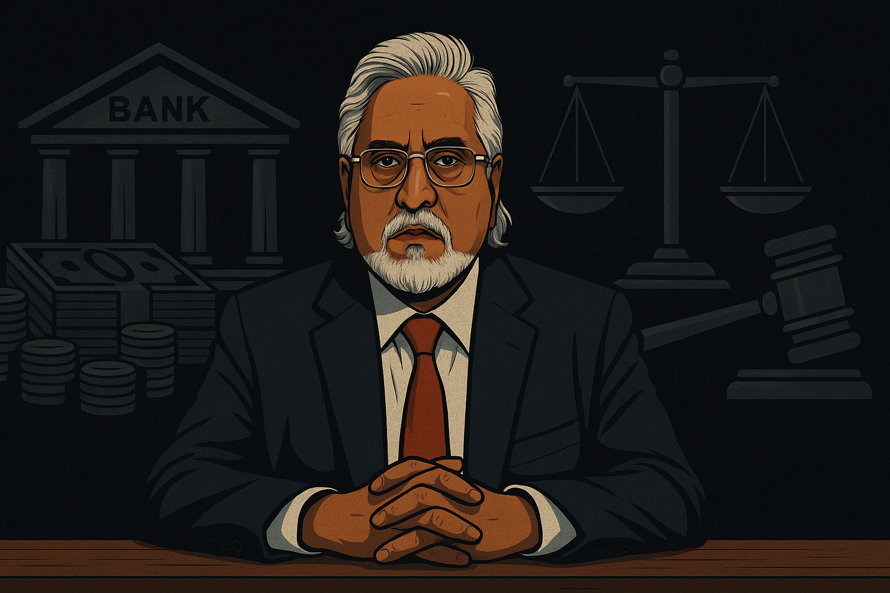The Vijay Mallya Scam: Lessons from India’s Biggest Loan Default Case

The Rise and Fall of the “King of Good Times”
Vijay Mallya was once the poster child of flamboyant entrepreneurship in India. His airline, Kingfisher Airlines, symbolized luxury and ambition. But behind the glamour was a financial house of cards. When the structure collapsed, it left over ₹9,000 crore in unpaid loans, a trail of regulatory failures, and a national debate on white-collar crime.
This is more than a story about a failed airline—it’s a deep look into how India’s banking and regulatory systems were manipulated, and how the fallout pushed the country toward serious reform.
What Really Happened?
A Dream Built on Debt
Kingfisher Airlines launched in 2005 with high hopes, promising premium service. But behind the glossy marketing, the company relied heavily on aggressive borrowing. Between 2007 and 2012, it secured multiple loans from a consortium of 17 banks, including major public sector banks like SBI, IDBI Bank, and Indian Overseas Bank.
Most of these loans became Non-Performing Assets (NPAs). Investigators later found that many were granted without proper due diligence—some under political pressure or influenced by Mallya’s status as a Member of Parliament.
How the Money Was Misused
Allegations of Fraud and Diversion
The Enforcement Directorate (ED) alleges that over ₹3,500 crore of the borrowed funds were diverted to other businesses and personal luxuries. This includes:
- Payments for a personal jet
- Transfers to Mallya’s IPL team (Royal Challengers Bangalore)
- Funds sent abroad for a Formula One team
- Over-invoicing of aircraft leases
Mallya was even found guilty of contempt of court for illegally transferring $40 million to his children.
The Legal Avalanche
Multiple Agencies, One High-Profile Target
The case involved nearly every major financial watchdog in India:
- CBI: Investigated criminal conspiracy and bank fraud
- ED: Led money laundering and asset seizures
- SFIO: Probed corporate misgovernance
- Debt Recovery Tribunal: Fixed the airline’s debt at ₹6,203 crore
- Supreme Court: Sentenced Mallya to jail for contempt of court
Mallya was officially declared a “fugitive economic offender” in 2019, allowing the government to seize his assets even without a conviction.
Where Are We Now?
More Assets Recovered Than Owed?
According to Finance Ministry figures, the ED has recovered ₹14,000 crore in assets—more than the estimated loan defaults. Mallya argues that this proves his debts are settled, and he should not be pursued further. However, legal proceedings continue in India and the UK, where he remains out on bail fighting extradition.
What This Means for India
A Wake-Up Call for Financial Reform
The Mallya case exposed glaring weaknesses in:
- Banking oversight
- Corporate governance
- Legal coordination between agencies
It also led to tangible reforms:
- Fugitive Economic Offenders Act (2018) to fast-track asset seizure
- Stricter lending norms and NPA monitoring
- More independent audits and whistleblower protections
A Shift in Accountability
This scandal signaled a major shift in how India treats financial crimes. What was once seen as “business failure” is now being prosecuted as intentional fraud. The case has also brought focus to the problematic overlap between politics and public sector banking, especially the so-called “Phone Banking” era.
Key Takeaways
- ₹9,000+ crore in loans defaulted by Kingfisher Airlines
- ₹14,000 crore recovered by Indian authorities
- Systemic failure in bank due diligence and political influence
- Multi-agency crackdown leading to landmark legal reforms
- A symbol of the shift toward criminalizing willful financial misconduct
Conclusion
The Vijay Mallya case is a landmark moment in India’s financial history. It exposed how charisma, status, and weak oversight can collide to create one of the country’s biggest banking crises. But it also sparked real reform—and a growing resolve to hold even the most powerful accountable.
FAQs
Was Vijay Mallya officially convicted of fraud?
No. While he has been convicted of contempt and declared a “fugitive economic offender,” the main criminal cases are still ongoing.
Has the Indian government recovered all the money?
Yes, according to official reports, over ₹14,000 crore has been recovered—more than the estimated loan default.
Why hasn’t Mallya been extradited yet?
He’s been fighting extradition in the UK courts, citing concerns about Indian prison conditions and due process.
What changed in India after this scandal?
New laws like the Fugitive Economic Offenders Act were passed, and banks now face stricter lending oversight.
Disclaimer
The stocks mentioned in this article are not recommendations. Please conduct your own research and due diligence before investing. Investment in securities market are subject to market risks, read all the related documents carefully before investing. Please read the Risk Disclosure documents carefully before investing in Equity Shares, Derivatives, Mutual fund, and/or other instruments traded on the Stock Exchanges. As investments are subject to market risks and price fluctuation risk, there is no assurance or guarantee that the investment objectives shall be achieved. Lemonn (Formerly known as NU Investors Technologies Pvt. Ltd) do not guarantee any assured returns on any investments. Past performance of securities/instruments is not indicative of their future performance.







